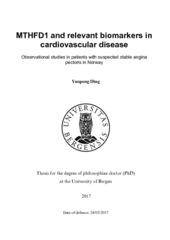| dc.contributor.author | Ding, Yunpeng | en_US |
| dc.date.accessioned | 2017-03-23T08:36:34Z | |
| dc.date.available | 2017-03-23T08:36:34Z | |
| dc.date.issued | 2017-03-24 | |
| dc.identifier.isbn | 978-82-308-3110-6 | en_US |
| dc.identifier.uri | https://hdl.handle.net/1956/15604 | |
| dc.description.abstract | Background: As the leading cause of death globally, cardiovascular disease (CVD) is a major public health burden. Epidemiological and experimental studies consistently demonstrate an association between elevated total plasma homocysteine and increased risk of CVD, but intervention studies with B vitamin treatments to lower homocysteine levels have failed to result in major clinical benefits. The highly interconnected network of one-carbon metabolism (OCM) makes it difficult to delineate pathways associated with pathogenesis and the responsible factors with a simple biomarker. On the other hand, genetic variations with implications on certain metabolic pathway may serve as a more robust proxy for life-time susceptibility to CVD outcomes, which may allow evaluation of causal inference. Objectives: We investigated a trifunctional gene in OCM, methylenetetrahydrofolate dehydrogenase 1 (MTHFD1), in relation to the risk of acute myocardial infarction (AMI) in patients with suspected stable angina pectoris (SAP) and potential effect modifications from B vitamin treatments. Furthermore, since MTHFD1 and the interconversion between serine and glycine are the major sources of methyl groups for OCM, interactions of MTHFD1 with serine and glycine levels, as well as their independent risk associations, were also studied. Methods: The study is based on the Western Norway B Vitamin Intervention Trial (WENBIT) and Bergen Coronary Angiography Cohort (BECAC), including 4164 patients with suspected SAP recruited during 2000-2004. All participants underwent blood sampling immediately before or after elective coronary angiography and were subsequently followed for clinical endpoints throughout the year 2006 (Paper I and III) or 2009 (Paper II). Specifically, for paper I and III, the study population was restricted to patients in WENBIT since genetic information was only available in this cohort (Paper I, n=2381; Paper III, n=2571, respectively) while Paper II incorporated the whole population (n=4164). Results: Paper I identified that a common and functional MTHFD1 polymorphism, rs1076991, was associated with increased risk of AMI. Subgroup analysis revealed that the risk association was likely introduced by the combined treatment with folic acid+B12 and vitamin B6. In paper II, we observed an inverse dose-response relationship between plasma glycine and risk of AMI, primarily in patients with elevated serum apolipoprotein B, LDL cholesterol and apolipoprotein A1. Paper III demonstrated that the risk associations of both plasma serine and glycine on AMI occurrence were modified by two common polymorphisms in the MTHFD1 gene: rs2236225 and rs1076991. Conclusion: The current project links a key gene in OCM to acute atherosclerotic complications, possibly by interacting with serine, glycine and lipid metabolism as well as with B vitamin treatment. | en_US |
| dc.language.iso | eng | eng |
| dc.publisher | The University of Bergen | eng |
| dc.relation.haspart | Paper I: Ding YP, Pedersen ER, Johansson S, Gregory JF, Ueland PM, Svingen GF, Helgeland Ø, Meyer K, Fredriksen Å, Nygård OK. B vitamin treatments modify the risk of myocardial infarction associated with a MTHFD1 polymorphism in patients with stable angina pectoris. Nutr Metab Cardiovasc Dis 2016;26(6):495-501. <a href="http://hdl.handle.net/1956/15291" target="blank">http://hdl.handle.net/1956/15291</a> | en_US |
| dc.relation.haspart | Paper II: Ding Y, Svingen GF, Pedersen ER, Gregory JF, Ueland PM, Tell GS, Nygård OK. Plasma glycine and risk of acute myocardial infarction in patients with suspected stable angina pectoris. J Am Heart Assoc 2015;5(1):e002621. <a href="http://hdl.handle.net/1956/12002" target0"blank">http://hdl.handle.net/1956/12002</a> | en_US |
| dc.relation.haspart | Paper III: Ding YP, Pedersen ER, Svingen GF, Helgeland Ø, Gregory JF, Løland KH, Meyer K, Tell GS, Ueland PM, Nygård OK. MTHFD1 polymorphisms modify the associations of plasma glycine and serine with risk of AMI in patients with stable angina pectoris in WENBIT. Circ Cardiovasc Genet. 2016 Nov 21. pii: CIRCGENETICS.116.001483. [Epub ahead of print]. Full-text not available in BORA. <a href="https://doi.org/10.1161/CIRCGENETICS.116.001483" target="blank">https://doi.org/10.1161/CIRCGENETICS.116.001483</a> | en_US |
| dc.title | MTHFD1 and relevant biomarkers in cardiovascular disease: Observational studies in patients with suspected stable angina pectoris in Norway | en_US |
| dc.type | Doctoral thesis | |
| dc.rights.holder | Copyright the author. All rights reserved. | |
| dc.subject.nsi | VDP::Medisinske Fag: 700::Klinisk medisinske fag: 750 | en_US |
